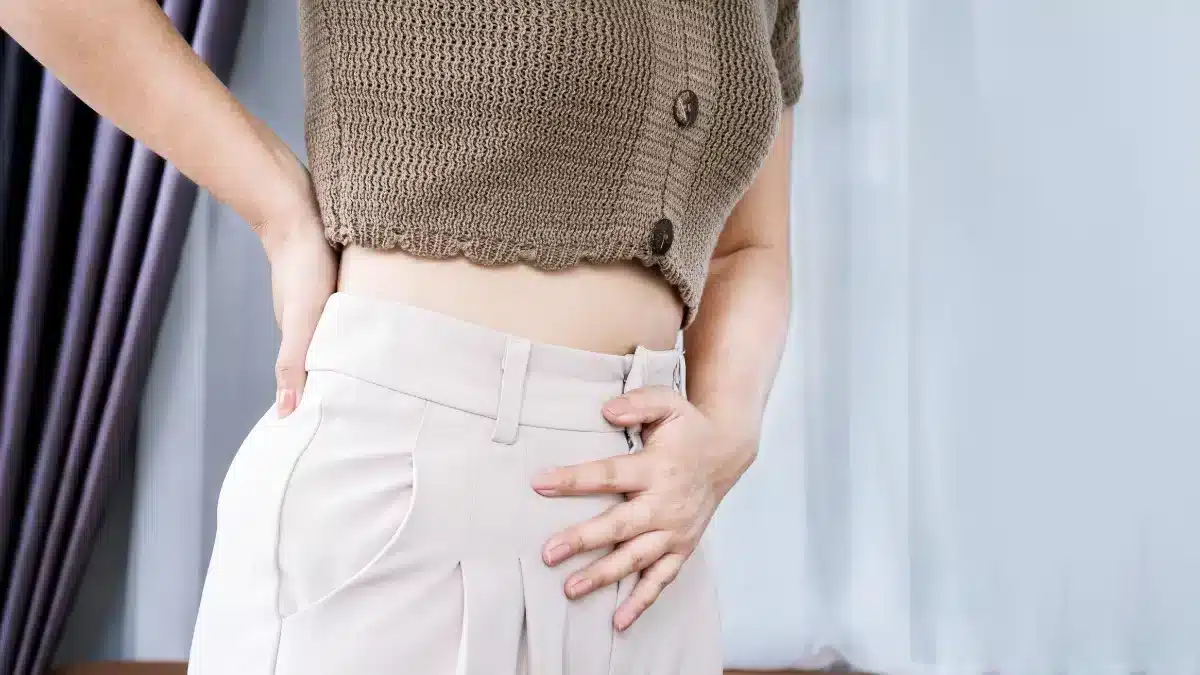Dealing with Ovulation Bloating: Exploring Reasons and Relief
Ovulation bloating can happen roughly in the middle of the menstrual cycle for some women.
It is not uncommon to experience bloating during this period; however, this can be discomforting.
It can cause pain and swelling, which may hamper daily activities.
So, to reduce the severity, it is important to find out the underlying reasons behind bloating.
In this article, you will find out why ovulation bloating occurs, how to reduce it, and explore other similar problems that can be mistaken for ovulation bloating.
What is bloating
Bloating is a condition where the belly is tight or full, mainly due to gas or other factors like hormonal changes.
It differs from a loose belly and is easier to notice in a toned abdomen.
The biggest difference between belly fat and bloating is that belly fat makes the stomach feel soft, while bloating makes it hard and tight.
Does ovulation cause bloating
Bloating can be caused by multiple reasons, one of which is ovulation.
During this period of the menstrual cycle, the Luteinizing Hormone and Estrogen levels rise.
These increased hormones can contribute to bloating.
Estrogen is known to raise water retention, especially when Progesterone levels are low.
Moreover, it can also lead to gas buildup and impact the digestive system, causing bloating.
A study by Nina S. Stachenfeld also found that Estradiol (the major female sex hormone and an Estrogen steroid hormone) caused consistent water due to sodium retention.
Another indirect reason for bloating during ovulation can be gassy foods like cabbage, lentils, and beans.
Difference between PMS bloating and ovulation bloating
Bloating is related to different stages of the menstrual cycle.
Besides ovulation, premenstrual bloating is also common among women.
It occurs one to two days before periods due to the water retention caused by hormonal fluctuations.
If bloating and other symptoms like pain, anxiety, and mood swings appear regularly 5 days before periods, it is then Premenstrual Syndrome (PMS).
It can interfere with normal activity and cause discomfort.
The main difference between ovulation bloating and PMS or premenstrual bloating is the time when bloating occurs.
If the bloating occurs around the middle of the menstrual cycle (two weeks before periods), then it is likely caused by ovulation.
It lasts for about 16 to 32 hours and goes away by itself in a while.
On the other hand, when bloating occurs a day or two before periods, then it is a sign of premenstrual bloating.
If the symptoms start appearing 5 days before and last up to four days after periods, then it is caused by PMS.
Does bloating after ovulation mean pregnancy

Bloating after ovulation does not necessarily mean pregnancy, as it is a common symptom of ovulation, PMS, and even unhealthy eating.
However, there is a possibility that bloating indicates pregnancy.
Hormonal changes during pregnancy can cause bloating.
Another reason for bloating is constipation.
It is a common problem during pregnancy.
According to a study by Sherri A. Longo, 10 to 40 percent of women experience constipation in pregnancy.
During this time, physical activity also decreases, increasing the chances of bloating.
Also, higher hormonal levels of Estrogen and Progesterone add to the problem as they increase bowel transit time.
To check if bloating is due to pregnancy, take a home test kit or visit your doctor.
How to reduce bloating during ovulation
There are some steps to ease bloating and discomfort during ovulation and some of them include:
Probiotics
Probiotics, whether food or supplements, can be great for relieving bloating.
A 2018 review based on Irritable Bowel Syndrome (IBS)patients found that some probiotics can help reduce bloating.
The supplements are suggested by a doctor, but you can try fermented foods rich in probiotics, like yogurt, kefir, kimchi, and miso, for relief.
Antispasmodics
These drugs reduce muscle spasms and are also used in the treatment of IBS.
They can effectively lower bloating.
A natural spasmolytic agent to relieve bloating is peppermint oil.
Besides Antispasmodics, Neuromodulators and Prokinetics can also be effective in managing bloating.
Always consult a doctor before using any medicine for safety and dosage.
Pelvic floor biofeedback
It is a type of treatment to strengthen and relax the pelvic floor muscles to treat dysfunctions of the pelvis.
In case defecation disorders are the reason for bloating, this method can help to reduce bloating.
Diet changes

You must avoid gassy foods like cabbage, lentils, beans, and Brussels sprouts.
Eat foods like oats, apples, bananas, cucumbers, yogurt, and avocados to manage bloating.
Additional suggestions
Some ways to ensure reducing bloating on an individual level are:
- Get your dentures checked
- Eat slowly
- Have smaller, more frequent meals
- Chew your food well
- Sit up straight after eating
- Drink beverages at room temperature
- Increase physical activity
- Take a stroll after eating
Other signs of ovulation
During ovulation, the cervical mucus is clear, stretchy, and wet, along with increased basal body temperature.
Along with bloating, a woman during ovulation may experience:
- Abdominal pain
- Light bleeding
- Breast tenderness
- Increased sex drive
- Better vision, taste, and smell
When to see a doctor

Bloating caused by ovulation goes away in some time without causing any trouble.
If it does not, you must contact a doctor in case of:
- Feeling bloated for 3 weeks or more
- Feel bloated regularly (more than 12 times a month)
- Bloating despite diet changes
- Swelling or lump in your tummy
- Bloating along with sickness, diarrhea, constipation, weight loss, or blood in the stools
- Difficulty in moving or doing daily activities because of bloating
Conclusion
Ovulation bloating is common, which lasts for some time and goes away on its own.
It can be accompanied by other symptoms of ovulation, like pain, breast tenderness, or mood changes.
However, bloating can be caused by PMS, pregnancy, and other medical conditions.
To eliminate doubts about the reason for bloating, you can contact your doctor and even conduct a pregnancy test if required.
In case of ovulation bloating, Probiotics, Antispasmodics, and Biofeedback therapy can offer relief.
Certain dietary changes, eating slowly, drinking water, and improved physical activity from your end can ensure minimizing the risk of bloating.
If the bloating is regular, remains for at least three weeks, or is accompanied by symptoms like diarrhea or weight loss, you must seek medical attention.
Keeping track of your menstrual cycle and paying attention to small signs can help in the effective management of bloating and avoiding risks.
Frequently Asked Questions
What are the symptoms of ovulation bloating?
Ovulation bloating can be accompanied by symptoms like discomfort or pain in the abdomen. Feeling full or swollen due to gas or water retention in this phase is common. Besides, the belly can look big and tight during bloating which is different from belly fat that feels soft.
How long does ovulation bloating last?
Ovulation lasts for 16 to 32 hours. So, its symptoms also last during this period and go away on their own. It occurs during the middle of the menstrual cycle. Some other reasons for bloating can be PMS and pregnancy.
Is bloating normal during ovulation?
Bloating during ovulation is normal. It occurs due to hormonal changes during this time. The Estrogen levels are high, which can increase water retention. Moreover, eating gassy foods like cabbage or lentils during ovulation can increase bloating.
How to reduce bloating during ovulation?
Probiotics, Antispasmodics, Neuromodulators, and Biofeedback therapy are some effective ways to reduce bloating. Avoiding gassy foods and eating apples, avocados, kimchi, and other foods good for the gut can also help manage bloating. Eating slowly, drinking plenty of water, and exercising also make a difference.
WowRx uses only high-quality sources while writing our articles. Please read our content information policy to know more about how we keep our content reliable and trustworthy.






